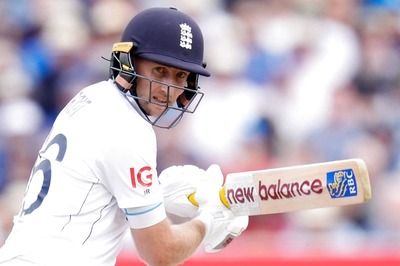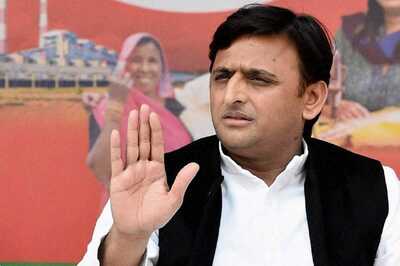
views
To those giving it a cursory glance, the three-day International Olympic Committee (IOC) Session at the Jio World Centre in Mumbai would appear to be just another conclave of world sports leaders. The reality is that it is a landmark opportunity for Indian sport to benefit from immense knowledge-sharing on the sidelines.
Of course, the IOC Session will become even more special for India as it is believed that cricket – a game that Indians follow with intense passion – would get the nod for inclusion in the Olympic Games programme for the 2028 Los Angeles Games. From a broader perspective, the session could not have come at a more perfect time for India.
In the decade-and-a-half since Abhinav Bindra became the first Indian to win an individual Gold medal at the Olympics, India has been making rapid progress towards becoming a sporting nation. The country’s sports ecosystem has geared itself up to ensure that Indians are no longer mere participants but turn up as competitors at global events.
It is an exciting time for Indian sport; a top 20 finish is possible in the 2024 Paris Games with five Gold medals. Doubling that tally of Gold can pitchfork India to a top 10 slot on the medal tally in 2028. Given the energy and the sharp focus on what it takes to get that, it is no longer a utopian thought to see India emerge as a sporting power.
The attitudinal change among athletes was best reflected in the Olympic Games in Tokyo and further reinforced in the Asian Games which concluded recently in Hangzhou with India crossing 100 medals for the first time. The great awareness of what it takes to be counted among the medal probables and the immense self-belief that the athletes bring to the table are a joy to behold.
These are the qualities that saw three Indians finish among the top six in the men’s Javelin Throw final at the World Athletics Championships in Budapest in August. It is such desire and belief that drives a Jyothi Yarraji, a product of the Reliance Foundation, to fight to be reinstated in the Asian Games 100m Hurdles final after she was wrongly disqualified.
These are attributes that make HS Prannoy back up his Thomas Cup heroics with a rare Asian Games medal for an Indian badminton player – and Satwiksairaj Rankireddy and Chirag Shetty rise as World No. 1 pair in men’s doubles. These are the traits that mark Harmanpreet Singh and the Indian men’s hockey team’s consistent performances, including the Asian Games Gold.
The range of sport in which Indians have shone at the international level is heart-warming, to say the least. From athletics to badminton, from boxing to wrestling, from archery to shooting, young Indians have begun to make waves and placed India among the nations to watch out for at international competitions.
With the Union government backing the growth of sports as a soft power, Indian sport has only gained from strength to strength. And, with a number of corporates supporting the movement in their own way, the collective will to succeed has become a powerful force that propels Indian sport in the best possible direction.
The pace increased in the wake of a disappointing show in the 2016 Olympics in Rio. Prime Minister Narendra Modi appointed an Olympic Task Force and a number of suggestions were embraced, and action taken on diverse fronts to make Indian sport more athlete-centric.
On their part, sports fans have begun to appreciate the athletes’ joy of effort on the international stage.
Besides, sports administrators have realised they will be held accountable if their disciplines are not making progress on the global front. They have moved to ensure that they plan the best training and competition progamme for their athletes. Many national sports federations now encourage coaches to go beyond NIS diplomas and acquire international credentials.
One of the significant contributions to the growth trajectory has been a better awareness of the need to provide the right scientific back-up to the athletes. The infusion of a number of strength and conditioning experts, trainers and physiotherapists, mind trainers and recovery experts in the support system has opened up new vistas for Indian sport.
The IOC Session offers the Indian Olympic Association and the national sports federations opportunities to engage with the IOC leadership and with the members of the IOC, many of whom drive international sports federations. This can be a great learning experience to usher in better governance and administration within India.
It is not as if the focus has been only on elite athletes. The Olympic Value Education Programme is gaining root in India with the Abhinav Bindra Foundation leading the way. With the Reliance Foundation signing an agreement with IOC, the core values of friendship, respect and excellence will find greater resonance among youngsters in India.
With such wholesome and conscious evolution, it is only a matter of time that India starts asserting its presence more tellingly. And there can be no doubt that the flow of information and the knowledge-sharing during the three days of the IOC Session will act as the catalyst that encourages a more conducive environment for India’s perceptible growth in the global sports landscape.
Rajaraman is a student of sport with 40 years’ experience as a writer. Views expressed in the above piece are personal and solely that of the author. They do not necessarily reflect News18’s views.



















Comments
0 comment